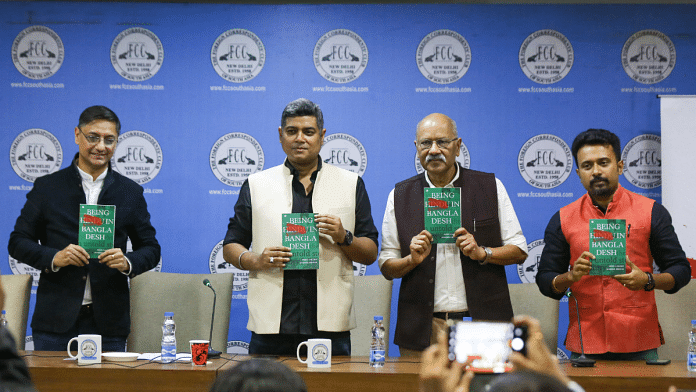New Delhi: The persecution of Hindus in Bangladesh was “not a one-time ethnic cleansing but a repeated process,” observed economist, writer and principal economic advisor to the Indian government, Sanjeev Sanyal, while discussing the plight of Hindu minorities in Bangladesh Monday.
Speaking at the launch of Being Hindu in Bangladesh: An Untold Story — authored by journalist Deep Halder and academic Avishek Biswas and published by HarperCollins —Sanyal also alluded to the partition of Bengal in 1947, and the crucial role played by Bengali Hindus in the freedom struggle. The event at Delhi’s Foreign Correspondents Club was also attended by ThePrint’s editor-in-chief Shekhar Gupta.
Halder and Biswas’s book explores the lives and voices of the Hindu minority in Bangladesh, who stayed back in East Pakistan (which became Bangladesh in 1971) after India was partitioned in 1947 — taking them beyond numbers and statistics and exploring their role in politics, culture, and society. The book quotes the Bangladesh Bureau of Statistics to say that there were 17 million Hindus living in Bangladesh in 2015, but adds that they are leaving the country owing to threats of violence or attacks.
“Hindus in Bangladesh are the Indians we left behind,” said Sanyal.
Gupta meanwhile stressed on the importance of minority communities in any country. “They smoothen the edges of any society and help provide balance. Therefore, it is important to keep Hindu communities safe in Bangladesh and India needs to work in that direction with Dhaka,” he said.
According to Halder, Hindus in Bangladesh suffer from “a sense of doom”, with many in the community in the country’s capital, Dhaka, fearing that there won’t be any Hindus remaining in Bangladesh in the next three decades.
The author contrasted India’s partition in the East and the West, and the subsequent separation of Bangladesh from Pakistan, by saying, “In the West, it happened one time, while in the East it continued to occur over decades”.
Highlighting the cycles of violence and persecution the Hindu minority has faced in Bangladesh over the years, Halder also spoke of his family’s roots in the country and the “refugee blood” he and Biswas have in common.
A journalist with over 20 years of experience, Halder is a columnist at ThePrint, writing on religion, caste, politics and much more in Bangladesh. He is also the author of Blood Island: An Oral History of the Marichjhapi Massacre (2019) and Bengal 2021: An Election Diary (2021).
His co-author for this book, Biswas, is an assistant professor of English literature at Vidyasagar College, Calcutta University. A PhD holder from Jadavpur University, he is working on archiving oral narratives of Partition history.
Also Read: Ex-IAS’ new memoir only attracts former civil servants. And they turn preachy
‘Plight of Hindus in Bangladesh in coming years’
Being Hindu in Bangladesh: An Untold Story also raises the question of “What after [Prime Minister] Hasina?”, with Biswas feeling that the plight of the minority community in Bangladesh will worsen if the opposition Bangladesh Nationalist Party (BNP) comes to power in next year’s elections in the country.
“The biggest year of Hindu migration from Bangladesh was post-2001 election when BNP came to power. Despite their criticism of the Awami League government [led by Prime Minister Sheikh Hasina], for Hindus in the country Sheikh Hasina is the last hope. How far that’s true requires more research, but that’s the sentiment. Ultimately, they do not want a hard right Islamic party in power,” said Biswas.
He added: “Instead of ‘after Hasina who?’ I would say, ‘after Hasina what?’ remains the more important question for the Hindus.”
Citing the example of when the then Pakistan government in 1967 had imposed restrictions on Rabindranath Tagore’s songs being played on radio, Biswas expressed his fear that the present Bangladesh was heading towards a similar fate, given the declining number of Hindus in the country today.
According to the 2022 national government census in Bangladesh, the percentage of Hindus in the country dropped to 8 percent in 2022 from 10 percent of the total population in 2011.
The author also discussed the contradictions of religion within Bangladesh, highlighting that while the Supreme Court reinstated the principle of secularism in the country’s constitution — which had been removed by an amendment made during former President Ziaur Rahman’s time — the state religion remains Islam.
(Edited by Richa Mishra)



